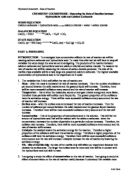What affects the Rate of Reaction when
Calcium carbonate is dissolved in nitric acid?
Introduction
This Sc1 is about looking at what affects the rate of reaction in an experiment and why it affects it. For example you can use several ways to find this out. One way is by adding a catalyst, by adding a catalyst you can increase rate without the catalyst being used up itself. Different reactions need different catalysts. They also can reduce the activation energy, this is good for big industries because the faster the product is made the less costly it will be. Activation energy basically means the energy needed to break reactant bonds. An example of a catalyst being used is, magnesium dioxide catalysing the decomposition of hydrogen peroxide. Another to see what affects the rate of reaction is to increase the temperature. By increasing the temperature, the particles will have more energy and will move faster. This will make them collide more and with greater energy. Changing the surface area affects the reaction as well. A larger surface area will give a faster reaction. This is because reactions happen on surface of solid reactions. An alternative is to increase the concentration of one of the reactants, e.g. when acids an involved you could increase the strength of it. This will equal more reactant particles in a certain volume so more chances of collisions. There is one last way that I found out from a science book, you could change the gas pressure. When reactants involve gases a higher pressure gives a faster rate. This is because pressure pushes particles together and there is more chance of collision. My group and me decided to do the change of the concentration because we think it would be better and we would see clear differences. We have to observe the time and gas given off and get as much results as possible. The reactants we are using are nitric acid (2HNO3) and calcium carbonate (Marble and Limestone CaC03). Our reaction can be written as:
Calcium carbonate is dissolved in nitric acid?
Introduction
This Sc1 is about looking at what affects the rate of reaction in an experiment and why it affects it. For example you can use several ways to find this out. One way is by adding a catalyst, by adding a catalyst you can increase rate without the catalyst being used up itself. Different reactions need different catalysts. They also can reduce the activation energy, this is good for big industries because the faster the product is made the less costly it will be. Activation energy basically means the energy needed to break reactant bonds. An example of a catalyst being used is, magnesium dioxide catalysing the decomposition of hydrogen peroxide. Another to see what affects the rate of reaction is to increase the temperature. By increasing the temperature, the particles will have more energy and will move faster. This will make them collide more and with greater energy. Changing the surface area affects the reaction as well. A larger surface area will give a faster reaction. This is because reactions happen on surface of solid reactions. An alternative is to increase the concentration of one of the reactants, e.g. when acids an involved you could increase the strength of it. This will equal more reactant particles in a certain volume so more chances of collisions. There is one last way that I found out from a science book, you could change the gas pressure. When reactants involve gases a higher pressure gives a faster rate. This is because pressure pushes particles together and there is more chance of collision. My group and me decided to do the change of the concentration because we think it would be better and we would see clear differences. We have to observe the time and gas given off and get as much results as possible. The reactants we are using are nitric acid (2HNO3) and calcium carbonate (Marble and Limestone CaC03). Our reaction can be written as:







